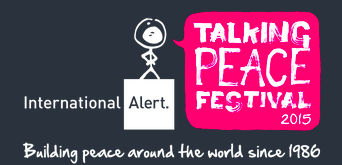International Alert, with partnership from Data-Pop Alliance, hosted this event in September 2015.
#peacehack, an initiative by International Alert, convenes technologists, designers, developers and peace practitioners to formulate ideas and solutions for identifying and stopping violent conflict in order build peace.
The first #peacehack took place in September 2014 in London as part of International Alert’s inaugural Talking Peace Festival. Following on from the success of #peacehack 2014, Alert partnered with several groups to organise simultaneous hacks in five cities around the world over the weekend of 26–27 September 2015 as part of the second Talking Peace Festival. The hacks were all virtually linked to each other and targeted participants who have strong technology skills (programming and design) and an interest in peace – though they may lack the field expertise in peacebuilding. The challenges each hack tackled emerged through consultations with peacebuilding practitioners in each city, who were asked to think about big problems they have in their programming and/or ideas they have for technology that could be helpful in peacebuilding.
Data-Pop Alliance was key partner in PeaceHack Barcelona (#peacehackBCN), hosted by BuildUp in Barcelona, Spain. The hack took place over 36 hours, starting at 9am on September 26 and ending at 12pm on September 27. The Data-Pop Alliance challenge focused on making cities safer through data. The opportunity cost of not using predictive tools as they become available to combat human rights violations is significant. However, these tools also pose a number of challenges regarding privacy and safety, including the risks of profiling and reinforcement of existing inequalities. In the case of Bogota, this #peacehackBCN challenge examined the promises and perils of crime prediction. The goal was to provide recommendations that address ethical and technical challenges surrounding:
1. Predictive accuracy of place-centric crime model;
2. Implications of big data analytics for privacy, safety and issues of access;
3. Practical applications for policy and community-level interventions on crime prevention.

